Sector wide approach in health policy response and framework in Zimbabwe
Abstract
The discourse is on the Sector Wide Approach (SWAp) in health, a policy reform intervention by the World Health Organization, and focuses on Zimbabwe’s response, and the subsequent health policy framework. A SWAp is a government led partnership with donor agencies and the civil society, in the formulation, implementation, monitoring and evaluation of the health policy. The rationale is to systematically build the capacity of health delivery systems and structures, for the realization health policy objectives through effective and efficient utilization of collaboratively mobilized resources for the realization of sustainable development in health. Zimbabwe has responded to SWAps by adopting the WHO Country Cooperation Strategy (2008-2013), being implemented through the National Health Strategy (2009-2013). A collaborative approach involving the state and civil society is being pursued. Within this arrangement, the Ministry of Health and Child Welfare is leading the strategic and operational function, at all levels of society, with the donor community, through the civil society playing a supportive role particularly in areas which include HIV/AIDS, tuberculosis, malaria, water and sanitation, and maternal health. Coordination is done through the National Planning Forum, made up of the health ministry and the voluntary sector, and the Health Development Partners Coordination Group, made up of donor agencies in health, in line with the Zimbabwe United Nations Development Assistance Framework and the Interagency Humanitarian Coordination Mechanism. It was concluded that a framework has been put in place through which the SWAp is being pursued, towards systematic capacity building of Zimbabwe’s health sector.

